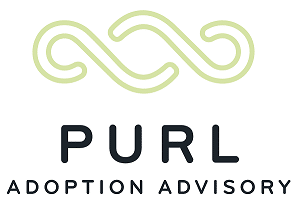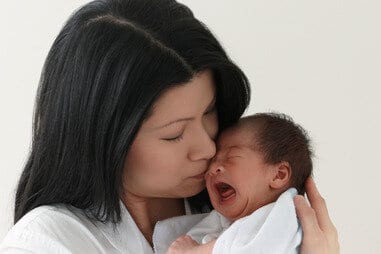Today’s guest blog post is written by a mom through adoption, and a former Purl family. She is writing anonymously so that we can continue to protect her child’s adoption story.
—
When you decide that adoption will be a means to growing your family, you’re saying yes to a great deal of unknowns, whether you realize it or not. Post-home study, once you’re working with an adoption professional like an advisor, licensed agency, or an adoption attorney, you’ll be confronted with your “preferences” for your child and the circumstances in which he or she has been conceived and born.
When you say yes to adoption, you say yes to an absence of control.
You will be asked to document, usually with some sort of checklist, what traits and circumstances you’re open to in your future child. What races will you consider? Will you accept both a boy or a girl? What kinds of circumstances within a child’s biological family are you unwilling to risk? Will it be acceptable to you that your child’s parents may be incarcerated, or maybe they were in the past? Have you ever given thought to substance abuse during a pregnancy? What if a child was exposed to illegal drugs in utero?
As a waiting adoptive mother, considering these preferences and documenting them was painstaking. This was my child we were talking about. How do I say no to a child I’ve longed for? But realistically, what am I prepared to handle as a mother? If I had had biological children, which of these things would I have had control over and which would I have not?
Ultimately, what it came down to for me was whether I was capable of providing for my child, whatever the circumstance might be. For me, being a mother was being a mother, and my answer was, “Yes.”
It’s important to be informed, though, and to come to the most honest conclusions for yourself and your family. If you don’t have the resources to provide for a child with major medical issues, your family will not be the most appropriate fit for that child. If you are unable or unwilling to adjust your life and home to reflect the racial diversity that a child of another race deserves to be immersed in, then you would be doing that child a disservice by inviting a transracial adoption.
And if your child has been exposed to substances in utero but you can’t imagine seeing past that or not always wondering if every issue or struggle he or she experiences comes back to that exposure, then you are not the parents for that child.
If, though, your answer is yes to that child exposed to substance abuse, there are many things to consider. First, find out as much as possible about your child’s exposure, to what substances, for how long, and how frequently. Know that whatever is self-reported by a biological mother may not be the whole truth. As badly as you want to be selected as adoptive parents, she wants to be accepted by you. She may be afraid that her honesty will keep that from happening. Often, you can assume the exposure has been greater than has been self-reported.
You must learn how you can prepare for your child’s arrival and the difficulties he or she may have in their first moments on earth, whether that be an early delivery, a low birth weight, or full withdrawal symptoms that require a NICU stay. You should consult with your pediatrician or consider resources like MothertoBaby or Adoption Medicine Clinic about what to expect and how you can best nurture your child’s needs from birth through early childhood and beyond. You should learn what the medical research says about exposure to specific substances and what that road may look like down the line. Explore early intervention services in your community and learn about their value to development. But you should also have faith that love, providing for a child’s most basic needs, education, unconditional care, and breaking the cycle of addiction can go an infinitely long way.
Today’s guest blog post is written by a mom through adoption, and a former Purl family. She is writing anonymously so that we can continue to protect her child’s adoption story.
—
When you decide that adoption will be a means to growing your family, you’re saying yes to a great deal of unknowns, whether you realize it or not. Post-home study, once you’re working with an adoption professional like an advisor, licensed agency, or an adoption attorney, you’ll be confronted with your “preferences” for your child and the circumstances in which he or she has been conceived and born.
When you say yes to adoption, you say yes to an absence of control.
You will be asked to document, usually with some sort of checklist, what traits and circumstances you’re open to in your future child. What races will you consider? Will you accept both a boy or a girl? What kinds of circumstances within a child’s biological family are you unwilling to risk? Will it be acceptable to you that your child’s parents may be incarcerated, or maybe they were in the past? Have you ever given thought to substance abuse during a pregnancy? What if a child was exposed to illegal drugs in utero?
As a waiting adoptive mother, considering these preferences and documenting them was painstaking. This was my child we were talking about. How do I say no to a child I’ve longed for? But realistically, what am I prepared to handle as a mother? If I had had biological children, which of these things would I have had control over and which would I have not?
Ultimately, what it came down to for me was whether I was capable of providing for my child, whatever the circumstance might be. For me, being a mother was being a mother, and my answer was, “Yes.”
It’s important to be informed, though, and to come to the most honest conclusions for yourself and your family. If you don’t have the resources to provide for a child with major medical issues, your family will not be the most appropriate fit for that child. If you are unable or unwilling to adjust your life and home to reflect the racial diversity that a child of another race deserves to be immersed in, then you would be doing that child a disservice by inviting a transracial adoption.
And if your child has been exposed to substances in utero but you can’t imagine seeing past that or not always wondering if every issue or struggle he or she experiences comes back to that exposure, then you are not the parents for that child.
If, though, your answer is yes to that child exposed to substance abuse, there are many things to consider. First, find out as much as possible about your child’s exposure, to what substances, for how long, and how frequently. Know that whatever is self-reported by a biological mother may not be the whole truth. As badly as you want to be selected as adoptive parents, she wants to be accepted by you. She may be afraid that her honesty will keep that from happening. Often, you can assume the exposure has been greater than has been self-reported.
You must learn how you can prepare for your child’s arrival and the difficulties he or she may have in their first moments on earth, whether that be an early delivery, a low birth weight, or full withdrawal symptoms that require a NICU stay. You should consult with your pediatrician or consider resources like MothertoBaby or Adoption Medicine Clinic about what to expect and how you can best nurture your child’s needs from birth through early childhood and beyond. You should learn what the medical research says about exposure to specific substances and what that road may look like down the line. Explore early intervention services in your community and learn about their value to development. But you should also have faith that love, providing for a child’s most basic needs, education, unconditional care, and breaking the cycle of addiction can go an infinitely long way.


 Here’s what I’ve learned as a mother: children are shockingly resilient. They are brave and strong and capable. They are optimistic at their core. Whatever unfounded fears you’ve buried deep inside yourself will most likely never come to fruition. I have known many children who have suffered exposures in utero but then placed for adoption at birth and while some have had delays along the way, most are largely unaffected. They’re bright, smart, active, sunny children just like any other.
Here’s what I’ve learned as a mother: children are shockingly resilient. They are brave and strong and capable. They are optimistic at their core. Whatever unfounded fears you’ve buried deep inside yourself will most likely never come to fruition. I have known many children who have suffered exposures in utero but then placed for adoption at birth and while some have had delays along the way, most are largely unaffected. They’re bright, smart, active, sunny children just like any other.

